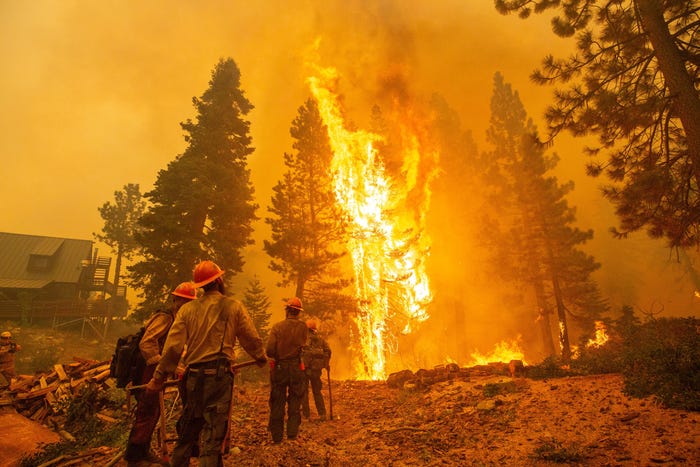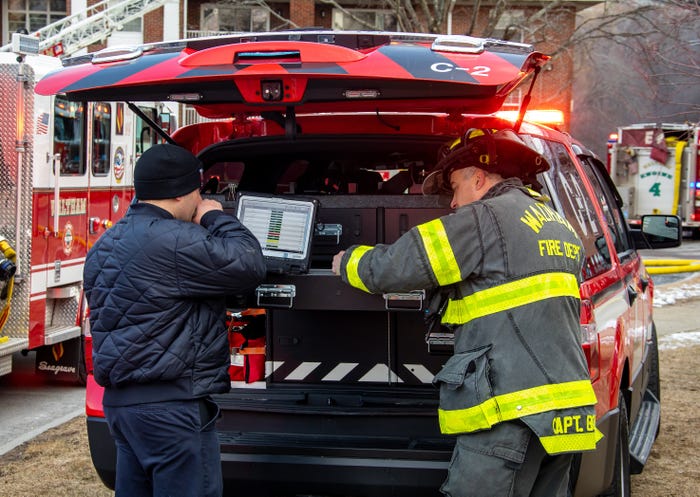AT&T speakers update status of FirstNet mission-critical services during IWCE
.jpg?width=1280&auto=webp&quality=95&format=jpg&disable=upscale)
FirstNet users can access all three 3GPP-standard mission-critical services—mission-critical push to talk (MCPTT), data (MCData) and video (MCVideo)—but some key interoperability capabilities are not yet commercially available, according to AT&T officials speaking at IWCE 2023 in Las Vegas.
Mike Newburn, principal architect of mission-critical solutions for AT&T’s FirstNet unit, said that FirstNet subscribers eventually will have at least two MCPTT offerings that will allow users to talk with other users of standards-based MCPTT services on FirstNet without the need for a gateway, but this capability is not available today.
Currently, FirstNet PTT—the service developed by Samsung that was unveiled three years ago—is the lone offering that is integrated fully into the FirstNet system in a manner that fully meets the 3GPP standards for on-network MCPTT communications, according to Newburn.
“FirstNet PTT was built from the ground up as a broadband solution for public safety,” Newburn said, noting contributions from the National Public Safety Telecommunications Council (NPSTC) to the 3GPP’s MCPTT standard. “It’s not an app and a server; it’s a service—a mission-critical service. So, that performance is different, because it’s built and engineered into the network to meet all of those global standard performance [criteria].”
FirstNet users also can utilize Rapid Response, a broadband push-to-talk solution built on the Kodiak platform owned by Motorola Solutions—the same platform used commercially by multiple carriers and one that is the foundation of the Enhanced Push to Talk offering that is available to FirstNet users.
Todd Early, senior executive director of public-safety solutions for AT&T’s FirstNet unit, said that the FirstNet Authority has been clear with its intention to ensure that public-safety users on FirstNet can choose from multiple broadband-push-to-talk offerings.
“One of the things the Authority asked AT&T to do was [to] have more than one push-to-talk communication capability,” Early said.
Rapid Response is a carrier-integrated solution—as opposed to over-the-top push-to-talk offerings—but the integration on the FirstNet system does not yet meet the all of the on-network requirements included in the MCPTT standard, Newburn said. However, engineers are working to develop Rapid Response into an MCPTT-compliant service on the FirstNet system, he said.
“The Kodiak platform that’s been in the market for a long time … we’ve evolved that into a newer product called Rapid Response to get it into that new lane of mission-critical,” Newburn said. “We’re taking a platform [Kodiak] that’s been a trusted capability and moving it into a mission-critical environment. Along that pathway, there’s a lot to transition … It’s on its pathway. It’s not complete yet.
“It’s mission-critical from a performance and accessibility [perspective]. There are many attributes [to develop]. The first one was to get an app to perform and behave correctly in the network, regardless of where you’re at. That’s the first step. It’s not through that journey yet [to reach full MCPTT compliance within FirstNet], but we have plans to bring it in.”
When that development journey is complete for Rapid Response, the intention is that users of Rapid Response and FirstNet PTT will be able to have interoperable MCPTT communications between each other, according to Newburn.
“Do they operate together? Not today,” he said. “[Rapid Response] will, in time.”
Many industry observers are closely monitoring interoperability developments associated with MCPTT, particularly the Rapid Response offering. In the commercial arena, Kodiak-based PTT offerings from different carriers currently do not support interoperable communications between each other, although many sources have indicated that this is the result of business decisions more than technical limitations.
Motorola Solutions was contracted to develop an MCPTT solution for the Emergency Services Network (ESN) public-safety broadband system in the United Kingdom (UK), but the vendor giant and the UK Home Office formally agreed to part ways on the project late last year.
Newburn noted that the FirstNet’s use of 3GPP standards for mission-critical communications (MCX) provides an environment for other MCPTT offerings to work on the FirstNet system in the future.
“The first step is to build that mission-critical core built on those standards,” Newburn said. “Now, companies like Softil have the ability to write that global software, so you have partners like Catalyst and L3Harris put it into devices that didn’t exist before.
“Also, mission-critical-software app developers can use that same library set … to create apps that are already in that supported ecosystem. So, it’s an easy way to bring more into that, instead of building a greenfield capability.”
And this same FirstNet core foundation also supports other 3GPP mission-critical services like MCData and MCVideo, which are sometimes forgotten amid the industry focus on MCPTT, according to Newburn.
“There are three parts [of MCX]—voice, video and data,” he said. “We’ve got mission-critical voice, video and data in our platform. So, I can have a video call just as fast as I can have a PTT call. I also have a way to share files through mission-critical data. That’s there today and exists.
“Obviously, that’s a smart broadband feature. When you get outside of voice, your [LMR] radio’s not going to have the ability to have a camera.”
But collecting such information is only part of the challenge. Newburn noted that sharing large data, photo or video files at an incident traditionally has been cumbersome—if not impossible—for first responders. LMR networks typically lack the capacity to transmit such files, while even commercial broadband networks may not work effectively if the system is overloaded, which can happen within a given cell sector when incidents occur.
Such contention is not a problem with MCData and MCVideo operating on the FirstNet system that provides public-safety users with always-on priority and preemption rights, Newburn said.
“With mission-critical data, think about [a scenario in which] you have a video or some kind of file,” Newburn said. “How many ways today can you send a 100 meg file on a mobile device? You can’t send it in an e-mail. Are you going to put it in a cloud drive? Are you going to try to text it?
“With mission-critical data [MCData], we have an ability to share a file up to 100 meg in a group-communication capability, without having to worry about figuring out which cloud service we have or can access in common.”
Newburn said that FirstNet users receive the MCData service as part of the FirstNet PTT subscription plan. MCVideo is available on FirstNet, but is a offered as a separate service, he said.
“Video is a different service, because we see that not everyone wants video,” Newburn said. “We separated that—just mostly from an operational perspective—because you don’t want everyone setting up your groups and just video chatting, just to make a social-media thing.”





